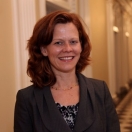
Ed. Note: Champions of Change is a weekly initiative to highlight Americans who are making an impact in their communities and helping our country rise to meet the many challenges of the 21st century.

I wasn’t sure what to expect as I traveled to DC earlier this week to be honored with a Champions of Change award from the White House. I was excited about the prospect of meeting Administration officials and felt honored to have been selected for such a platform to share with others what my colleagues and I are doing to improve care and outcomes for women with breast cancer. But as I reflect on the experience, what inspired me most was the “class” of champions with whom I shared the stage. Patient advocates, survivors, women living with metastatic disease, and other providers and researchers, who all shared their unique perspectives and tremendous contributions towards ending the devastating effects of breast cancer. We were there from different parts of the country representing not only our own institutions and advocacy organizations, but the millions of people whose lives have been affected by breast cancer.
Three clear themes emerged from our collective voice: 1) We have made progress particularly in the areas of targeted, tailored treatment for women with breast cancer — there is still much work to be done and now is a critical time to keep the momentum going (and not the time to decrease government funding); 2) We have to continue to streamline our research systems, partnering with academic, advocacy and governmental organizations as well as industry, to efficiently and effectively harness scientific findings to improve treatments and patient care — working in silos is no longer acceptable; and 3) We need to optimize the utilization of tools and treatments that have already proven to help women, and reduce disparities in access to high quality care.
I am thrilled to be spearheading an effort that represents a fruitful partnership between the advocacy and scientific communities, to improve the quality of care for young women with breast cancer, in particular. Young women have higher mortality rates from breast cancer than older women and are more likely to have difficulty adjusting both at diagnosis and in follow-up. In light of this, we developed the Program for Young Women with Breast Cancer at Dana-Farber Cancer Institute to provide comprehensive care to young survivors and focus on their unique needs including genetics, fertility and psychosocial concerns. Because of the success of our program locally, we have received an American Society of Clinical Oncology (ASCO) Improving Cancer Care Grant funded by Susan G. Komen for the Cure to develop, implement and evaluate a virtual program for young women to improve the care of women received in community care settings (where resources and expertise are generally not as available compared to a comprehensive cancer center). We believe this novel intervention, which engages both young patients and their providers at the point of care, will lead to tangible improvements in the present standard of care. In addition, we hope that this work can serve as a model to improve care and overcome barriers to delivering optimal comprehensive care for unique groups of patients in other settings.
Ann Partridge is the Clinical Director of the Breast Oncology Program at Dana-Farber Cancer Institute, an NCI designated comprehensive cancer center in Boston, Massachusetts.


